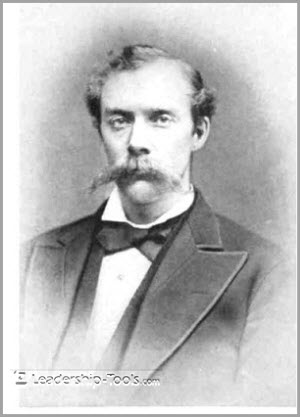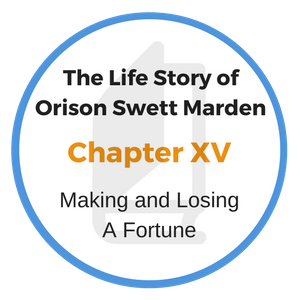- Home
- Self Growth Library
- Orison Swett Marden Chapter XII
Orison Swett Marden Chapter XII
No Surrender!
The Life Story of Orison Swett Marden Chapter XII:
Many years after he had conquered the difficulties that lay between him and the education he sought, Doctor Marden, in an article in Success Magazine entitled "No Surrender!" said:
"'No surrender!' must ever be the slogan of the man or woman who would overcome the obstacles that block the road to success.”
"The one who loses heart when he finds the way to his goal unexpectedly blocked — who waits for smooth conditions and favorable circumstances, — will not go far in this world."
"Conditions will never be such that success in any field will be a cake-walk. It is he who, at the start, makes up his mind to win in spite of adverse conditions — the man who, instead of surrendering to obstacles, rides over them, — this is the kind of man that succeeds in life. The very struggle to overcome the obstacles in his way develops the power that carries him step by step to his goal."
No one has better known the truth of those words than the man who wrote them.
His philosophy as well as his power had been developed in the rough school of experience. There was no other way to his goal than to blaze his own path through his forest of difficulties. And at every forward step some new or unforeseen hindrance had a way of presenting itself.
While working his way through Colby Academy, and afterward, he had
comforted himself at many crucial junctures with the thought that, when
he had reached the age of adulthood, the road to an education would not
be so hard. He would inherit enough from his father's estate to enable
him, perhaps, to go to New Hampton Institute, and afterwards to college.
He would have more time for study, too. All, or nearly all of the
daylight hours would not be crowded with the relentless struggle for
food, clothing, and shelter. He would have more leisure time to read
and think, and to digest what he read; more time for social life; more
opportunities to improve himself in every way, — in mind, in bodily
health, and in personal appearance.
"We fail to see that we can control our own destiny; make ourselves do whatever is possible; make ourselves become whatever we long to be."
- O.S. Marden
Bitter was the disappointment that awaited him. When twenty-one, he lost no time in calling on his guardian to claim his inheritance. He was then informed that there was practically nothing coming to him. In fact, he received only a small fraction of the money he believed his father had left to him, and when he appealed for justice to the probate judge, he obtained no satisfaction. The judge favored the guardian, and awarded him twenty-five dollars for his great kindness to the three orphan children!
While trying to reason with his guardian about the accounts which, he suspected, had not been properly kept, Mrs. Fifield interposed with: "What do you want with money? It would do you no good if you had it, for you will never amount to anything! Why don't you pattern yourself after my son George, who is envied by all the boys and admired by all the girls in town?"
George, who thought farming too hard work, had secured a position in Somerville, Boston, at a salary of forty dollars a month. He came home twice a year and, with his starched white collar and cuffs, necktie, and thin boots, seemed the epitome of the fashionably dressed man, compared to the gaping youth of the countryside.
Luckily, Orison had no yearning to pattern himself after this model. Now, with fifty dollars in his pocket, he started on his second academic adventure. He was determined to enter the New Hampton Institute, in New Hampshire. Walking much of the way in order to save stage fare, he finally reached his destination.
One can picture the tall, lean, awkward young man at this stage as a sort of replica of General Thomas Jonathan Jackson, of whom a biographer said: "When 'Stonewall' Jackson reached West Point one could read in his awkward figure and in his grim face - the determination that says, 'I have come to stay.'"
Young Marden had gone to New Hampton, to stay, although he appeared even more out of place among the advanced students there than he had at Colby Academy.
"With my coarse clothes and thick boots, I felt much out of place," he said. "It seemed to me that I had never before seen such smart 'fellers' as the seniors were. They carried canes, wore tall hats, and talked as if they knew everything. They could discourse learnedly for hours, on any question, in the society meetings.
Neither before nor since have I looked up to human beings as quite so irreproachable and awe-inspiring as I did those young men. Could it be possible that three years in the Academy would transform rough, homely, threadbare, green country boys like myself, for instance, into such refined and polished gentlemen?"
There was an offset, however, to the awe-inspiring seniors, for he adds: "The Dean and Principal of the Institute were very good to me and encouraged me to go on with my studies. But there was one thing, I said to myself, I could not do, I could not go out before the class and speak aloud.
When my name should be called and all eyes would be focused upon me, I would want to go through the floor. No, it would be even worse than that, for I would not be able to rise from my seat if thus called upon. So I went to the Professor of Rhetoric and pleaded with him to spare me this terrible ordeal. I told him that, if I were called upon to stand up and speak before the class, I should be obliged to leave the Academy and would thus be deprived of my chance of an education. Finally, the kind-hearted professor consented to allow me to write compositions in the place of public speaking, and to release me from speaking as long as he could do so without serious protest from the other students."
He worked through his first term in New Hampton in about the same way as at Colby, adding to his duties the ringing of the Academy bell and sweeping floors. He also spent his vacation in the old way, — farming, haying, and lumbering, — trying desperately to save some money for the beginning of the next term.
"The greatest trouble with most of us is that our demands upon ourselves are so feeble, the call upon the great within of us so weak and intermittent that it makes no impression upon the creative energies; it lacks the force that transmutes desires into realities."
- Orison Swett Marden
Orison Swett Marden Chapter XII , continued...
He had a lively recollection of his return that second term when a party of those awe-inspiring seniors drove by him in a mountain wagon on their five-mile ride from the station to the Academy. Still sensitive to the difference between their appearance and his, he fancied he could hear them laugh at him as he trudged along, carrying all his possessions in a bundle. He walked to save the cost of riding, for he knew that he would need every bit of the precious capital which the summer's work had netted him in addition to whatever he could earn as he went along.
This term he branched out into a new business. Although he knew nothing whatsoever about barbering, not even having been inside of a barber's shop, he conceived the idea of opening one for his schoolmates.
Dipping into his capital, he invested in a razor, a pair of shears, a comb, a wooden chair, and a yard of calico for a barber's apron. Having installed these "properties" in his little attic room, he opened it as a barber shop, advertising by word of mouth that he was ready for business.
His first customer was a youth who was planning to attend a ball that night. Seating himself in the chair provided for apprenticeship victims the young man called to the amateur barber, "Come, get busy and fix me up."
"Realizing that I would probably cut my patron at least once, I tore off bits of paper from a local weekly before starting to shave, and, whenever I drew blood, — which I did at least a half dozen times, — I would apply one of those pieces to the wound. 'Twas years ago, but I have not lived long enough since to forget the expression on that young man's face when he looked in the mirror. He was white as a sheet with anger, and I had to work very hard to pacify him. Finally I succeeded in soothing him by putting an extra amount of oil in his hair."
"This first shave naturally proved a very poor advertisement for me, so much so that I did not get another customer for several days. In desperation I asked a student with very long, stiff, straight black hair to exchange hair cuts with me. He agreed. I knew no more of the science of cutting hair than I did of shaving, and soon had the back of the fellow's head looking like a stairway. The more I attempted to cut down the stairs, the greater became the number of steps. I continued cutting deeper and deeper, until I had just about done a scalp job. I knew it would never do to let him seek consolation by cross-haggling my hair, so I bowed out and begged his forgiveness. I stuck to the barber shop, however, improving with practice, until, at the end of the year, with my original razor and pair of shears, I had earned nearly one hundred dollars."
Trouble was brewing for the amateur barber in the rhetoric class however. His fellow students had noticed that he was not called upon to speak. He began to fear that the professor would speak to him about it. He did. One day he told him that he could not be excused any longer from speaking, that the other members of the class were not willing to allow him to be exempted any more than anyone else. Besides, as the professor insisted, he was only increasing his bashfulness and further weakening himself by not at least making an effort to overcome it.
"I pleaded," he says, "that it was impossible for me to speak in public, and that, if forced to do so, I should have to leave school. But it was no use, for he was stern and paid no heed to my argument. I saw that a crisis had come. It was a question whether I should leave the Institute and sacrifice what I had already accomplished, or summon courage to go up on the platform and speak. It was up to myself to decide."
"I went out into the woods, about a mile and a half from the school, and had a good heart-to-heart talk with myself, winding up something like this:
'Now, Orison Marden, you are right square up against it. Either there is
something in you, or there is not, and the quicker you find out the
truth the better. If there isn't anything in you, you would do better to
go back to the woods, the saw-mill, the farm, the stumps, and the
rocks. If there is anything in you, you will go back to the Academy and
tell the professor that you are going to remain there and try to do what
is required of you, even if you die in the attempt.'
I decided upon the latter course.
"Selecting a piece that appealed to me, I went out into the woods daily to practice my speech. The fatal Wednesday speaking day came. I had scarcely closed my eyes the night before. The class had assembled. The professor called the students in turn. Finally he got down the alphabet near the M's. Never shall I forget the sensation which rushed through my brain when I heard my name called. Oh, the cold chills, the clammy sweat that ran down my back, the deathlike silence that filled the room as all eyes were turned upon the green, awkward, tall, timid chap from the country! Everything had grown dark. There seemed to be only a little glimmer of light at the window openings. I tried to rise, but felt glued to my seat. At length I pulled myself up, and, with a scarlet face, staggered to the platform and made my bow. My lips were parched. I tried to speak, but my voice stuck in my throat and for one awful moment everything I had ever known fled from my memory. Then I stammered something, halted, broke, started in again, and, although my wits seemed to be all gone, struggled through my piece. My legs trembled so that I had to keep shifting from one foot to the other in a vain effort to hide my embarrassment."
"At length the ordeal was over and I managed somehow to get back to my seat. But, so great was my chagrin and mortification, I again wavered in my determination. In the bitterness of my failure I felt that I could never again go through the humiliation and the awful suffering of such an experience, — that I would quit the Academy first. I spoke to the professor once more, but he was relentless."
"I went to my room and wrestled with myself. This was final, and I vowed to conquer my bashfulness and timidity and not make such an exhibition of myself the next time I was called on to speak."
So well did he succeed in keeping his vow to himself that, a few months later, he won the second prize in oratory. Moreover, for public speaking at the Commencement exercises, he was awarded the first prize; and for two successive years he ranked first in oratory and original composition.
A New Hampton student, who had become acquainted with young Marden in his second year at the Institute, said of him: "He had entered with very poor preparation, far behind most in his class; yet in the second year, he was one of the most prominent men in the school." Throughout his stay there he maintained a high rank in scholarship and character, and his influence was felt for good in every department of the institution.
During the worst of his struggle at New Hampton he received much encouragement and some advice from Professor A. B. Meservey, toward whom he ever after cherished the liveliest feelings of affection and gratitude. Only one who has struggled under similar disadvantages to get an education can realize what it meant to him when this kindly instructor, coming to him one day and putting his hand on his shoulder, said:
"Marden, I have noticed that you are having quite a struggle to get an education. Now, I want to tell you that the day will come when the boys in the Institute, sent here by wealthy parents — boys who dress so much better and live so much better than you do — will look up to you instead of down upon you, as you now believe they do."
On another occasion, when his load seemed beyond his strength, and, work as he might, he couldn't earn more than eight or ten cents an hour, the professor cheered him up with the words, "Remember, Orison, that every hour you spend in honest self-improvement is worth more than a dollar to you."
His conquest over himself in the matter of speaking before his class seemed to release some new power in him that thereafter made his educational problem easier to solve.
Following that personal triumph, at the close of the term, he secured a position as waiter in the Crawford House, one of the famous hotels of the White Mountains. It was there that he first met Frank A. Munsey — who later became the famous newspaper and magazine proprietor and publisher. Munsey was then filling the double position of waiter and telegraph operator at that hotel. The two young men struck up a friendship which continued through Marden's whole life.
On his return to New Hampton at the opening of the fall term of 1872, he utilized his summer's experience at the Crawford House in starting a students' eating club. This venture proved so successful that later, when working through Boston University, he organized a similar club for professors and students.
He had at length succeeded in getting his feet firmly on the educational ladder. Incidentally, he had begun a training in the hotel business which later made him financially independent, and it might have even made him wealthy had he been so inclined. During the remainder of the academic course, he spent his summer vacations at the Crawford House, the last year as head waiter.
In the meantime, to such purpose had he continued his work in voice production and debating that he had become well known in those areas. He was also active in the "Literary Club." Throughout the curriculum he was proving the truth of what, in after years, was one of his favorite maxims — "He can who thinks he can."
In 1873, having completed the full academic course, he was graduated with honors and left New Hampton Institute with the affection and esteem of his teachers and fellow students and the good wishes of all the townspeople. Marden's classmates at New Hampton well remember the optimistic youth of those days, whose ready smile, unvarying courtesy, and friendly nature made him a general favorite.
"It is those who have this imperative demand for the best in their
natures, and who will accept nothing short of it, that holds the banners
of progress, that set the standards, the ideals, for others."
"He was a kind and genial fellow" said Dr. Ellen A. Wallace, of Manchester, New Hampshire. "I remember him in many good times as well as serious ones, but under all circumstances he was a gentleman." Charles W. Weeks, of Rochester, New Hampshire, another classmate, recalled how Marden's smiling face won the respect and good-will of all with whom he came in contact.
"You will remember," he wrote in a letter to Dr. Wallace, "that the late Elder Neal came to New Hampshire at the age of thirty and entered our class in preparation for the ministry. Mrs. Neal, who was as old, if not older, accompanied him. Not being a member of the school, she did not feel like attending all of the class functions, but Marden would come around and insist that she do so. Mrs. Neal spoke of this to me the last time I met her. I refer to it only to show his desire to make everyone feel happy and welcome."
Perhaps the most intimate picture of Marden, the New Hampton student, is given by Dr. Edmund March Vittum, pastor of the First Congregational Church, in Muscatine, Iowa. Dr. Vittum, who seems to have been more closely associated with Marden than was any other student then at New Hampton, says:
"We were roommates as well as classmates. We attended the same classes, ate at the same table, studied under the same lamp, slept in the same bed, and prayed together every day. I loved him as one loves a brother; and, although he was five or six years my senior, I think he felt a similar attachment for me. At least, he was of great assistance to me from the beginning of my attendance at the New Hampton school. He had been there before and 'knew the ropes.'"
"He was bright in intellect, resourceful in practical affairs, clean in body and mind, pure in heart and soul, upright in life. Though Fate had robbed him of his boyhood, she had not succeeded in inoculating him with bitterness and gloom. His boyhood returned to him after he attained adulthood, and he was cheerful, buoyant, hopeful, — one of the most genial and jolly of companions. Inexperienced though we were, we saw in him, not the foreshadowing, but the foreshining of his future greatness."
"He had the natural art of making friends and he specialized in friendship. 'He was my friend, faithful and just to me.' Though our friendship has not proved to be what is usually called 'lasting,' still it is one of those unseen living realities which cannot die. No one could know Orison Swett Marden as I knew him without being influenced by his wonderful personality. His friendship is one of the best things that entered into my early education; and I still think of my friend, Orison Marden, when I repeat the suggestive words of Henry Van Dyke:"
Oh, who will walk a mile with me along life's merry way? -
And who will walk a mile with me along life's weary way? -
Mid summer's heat and winter's rain, -
And then, farewell! — we shall meet again.







